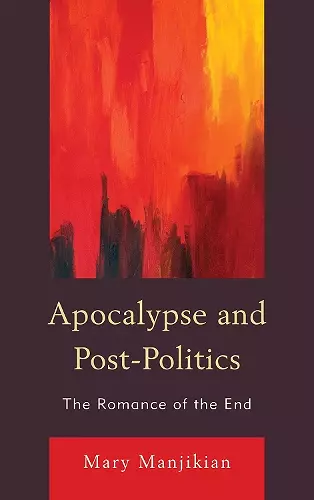Apocalypse and Post-Politics
The Romance of the End
Format:Hardback
Publisher:Lexington Books
Published:15th Feb '12
Currently unavailable, and unfortunately no date known when it will be back
This hardback is available in another edition too:
- Paperback£46.00(9780739190661)

Mary Manjikian’s Apocalypse and Post-Politics: The Romance of the End advances the thesis that only those who feel the most safe and whose lives are least precarious can engage in the sort of storytelling which envisions erasing civilization. Apocalypse-themed novels of contemporary America and historic Britain, then, are affirmed as a creative luxury of development. Manjikian examines a number of such novels using the lens of an international relations theorist, identifying faults in the logic of the American exceptionalists who would argue that America is uniquely endowed with resources and a place in the world, both of which make continued growth and expansion simultaneously desirable and inevitable. In contrast, Manjikian shows, apocalyptic narratives explore America as merely one nation among many, whose trajectory is neither unique nor destined for success. Apocalypse and Post-Politics ultimately argues that the apocalyptic narrative provides both a counterpoint and a corrective to the narrative of exceptionalism. Apocalyptic concepts provide a way for contemporary Americans to view the international system from below: from the perspective of those who are powerless rather than those who are powerful. This sort of theorizing is also useful for intelligence analysts who question how it all will end, and whether America’s decline can be predicted or prevented.
Manjikian reads catastrophe fiction as a symptom of how great powers fear loss of status, and treats it as an arena for practicing humility. A timely analysis of a sub-genre of timely warnings to post-9/11 America. -- Iver Neumann, Norwegian Institute of International Affairs
Apocalyptic literature offers a vantage point on our own world by making us powerless, vulnerable, and fearful. Manjikian shows how post-9.11 works in this genre suggest that the death of America, and indeed, of civilization, is less incomprehensible than its existence. These novels and films and her book inspire respect for values that we all too often take for granted. -- Richard Ned Lebow, King's College, London
Manjikian (Regent Univ.) aims to show that apocalyptic literature can have a beneficial political impact. While she distinguishes among catastrophic, utopian, and apocalyptic works, which have a conservative, liberal, and critical intention respectively, Manjikian clearly favors the latter. Apocalyptic writing done well is subversive in a good way; it can show the powerful what they are doing to the powerless and change their perception of the world. Manjikian's hope is that this literature could lead to a more harmonious world, especially in the realm of international relations. Manjikian provides strong evidence for the political power of words, and hers is an exemplary work on how to apply literary theory to the study of international politics. Summing Up: Recommended. Upper-division undergraduate, graduate, and research collections. * CHOICE *
ISBN: 9780739166222
Dimensions: 239mm x 161mm x 29mm
Weight: 671g
344 pages